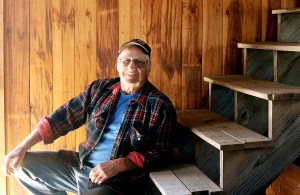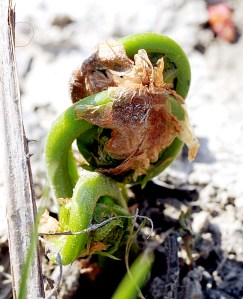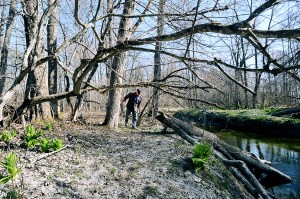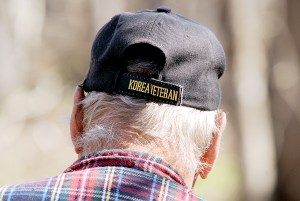Arthur Charest said a patch of fiddleheads is like a good fishing hole.
“You don’t tell anybody where it’s at,” Charest said.
The Auburn man has marked the month of May each spring by picking fiddleheads. He started the hobby in 1957, when he returned home from the Korean War.
Fiddleheads are the furled tips of young ostrich ferns. The tips resemble the end of a fiddle, which is how the baby ferns got their name, Charest said.
Charest likes to boil the fiddleheads and season them with salt, pepper and butter. But the primary reason Charest picks them is for the exercise.
“At 79, I need exercise, and that’s the kind of exercise I like.”
Charest walks along the river for about four miles to pick the plants. “That sure beats a treadmill,” he said.
Once the season begins, usually the last week in April, Charest will go out daily. “I try to pick every day that it’s not raining,” he said. “Wet fiddleheads are very tough to clean.”
Charest said the season will start when there are three to four days of 60- to 70-degree weather in a row.
“The warmer it is, the faster they grow,” said the retired shoe worker. The peak of the fiddlehead season will come 10 to 12 days after it begins, and it lasts for about 28 days, he said.
“On a good day, I can pick 15 to 20 pounds a day,” he said.
Charest said that carrying the fiddleheads out of the woods is the hardest part. “I wish I could pick 100 pounds a day, but I can’t.”
Charest leaves his home to pick at 6 a.m. each morning. “I do that so I don’t get stuck behind the school buses.”
The fiddleheads are found along any small river or tributary, Charest said . “They like sandy bottoms and sandy banks.” Rivers with lots of bends and curves cater to fiddleheads, he said.
He believes that fiddleheads re-seed themselves when high water picks them up and deposits them on a bank farther down stream.
“Everything I know, I observed in the woods,” said Charest, who bought nine acres of forested land along a river because “it’s loaded with fiddleheads.”
His land lays low and often floods. But he didn’t buy it to build on. “There is not much you can do with it but enjoy it,” Charest said. “This is my haven for walking.”
He does allow others to pick on his land. “As long as you take your trash with you, you can pick what you want. There is enough out there for everyone.”
Once back home from picking, Charest puts out a sign advertising that he has fiddleheads for sale, cleaning the plants as customers stop by.
“I cater to the old folks that are retired, mostly. They are on fixed incomes, so I take care of them,” said Charest, who sells the fiddleheads for $3.50 per pound.
“By the time I clean them all, it’s 7 p.m.,” Charest said. “It’s a lot of work, but it keeps me healthy.”
Charest doesn’t know how many more years he will continue to hunt fiddleheads. Sore legs at night are becoming more and more common, he said. “Old age is a bitch, and you can’t do anything about it. At 79, you don’t know what’s going to hit you. But, if I’m up for it — I may go next year.
“When I get too old, I am going to miss all this,” Charest said, looking across his secret river.




Comments are no longer available on this story